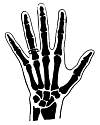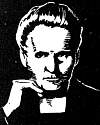 But the most startling development took place when he put his hand
between the tube and the screen. The bones absorbed more of the rays
than the flesh and there on the fluorescent screen he saw the outline
of his hand with the bones inside clearly outlined as a denser shadow.
But the most startling development took place when he put his hand
between the tube and the screen. The bones absorbed more of the rays
than the flesh and there on the fluorescent screen he saw the outline
of his hand with the bones inside clearly outlined as a denser shadow. On December 22, 1895, he replaced the screen with a photographic plate and asked his wife to place her hand between the plate and the tube. He feverishly developed the exposed plate and out with the world's first radiograph - a picture of his wife's hand clearly showing the bones and ring on her finger. Röntgen's discovery made a startling impression upon the general public. The story of the rays that revealed the bones in the human body quickly appeared in the press.  Here in America, Thomas Edison
built a
fluoroscope, a device somewhat
like the old stereoscope except it was equipped with a screen that
would glow in the presence of X-rays. Now any object placed between the
fluoroscope and the tube would appear as an X-ray shadow on the screen.
Here in America, Thomas Edison
built a
fluoroscope, a device somewhat
like the old stereoscope except it was equipped with a screen that
would glow in the presence of X-rays. Now any object placed between the
fluoroscope and the tube would appear as an X-ray shadow on the screen. |








